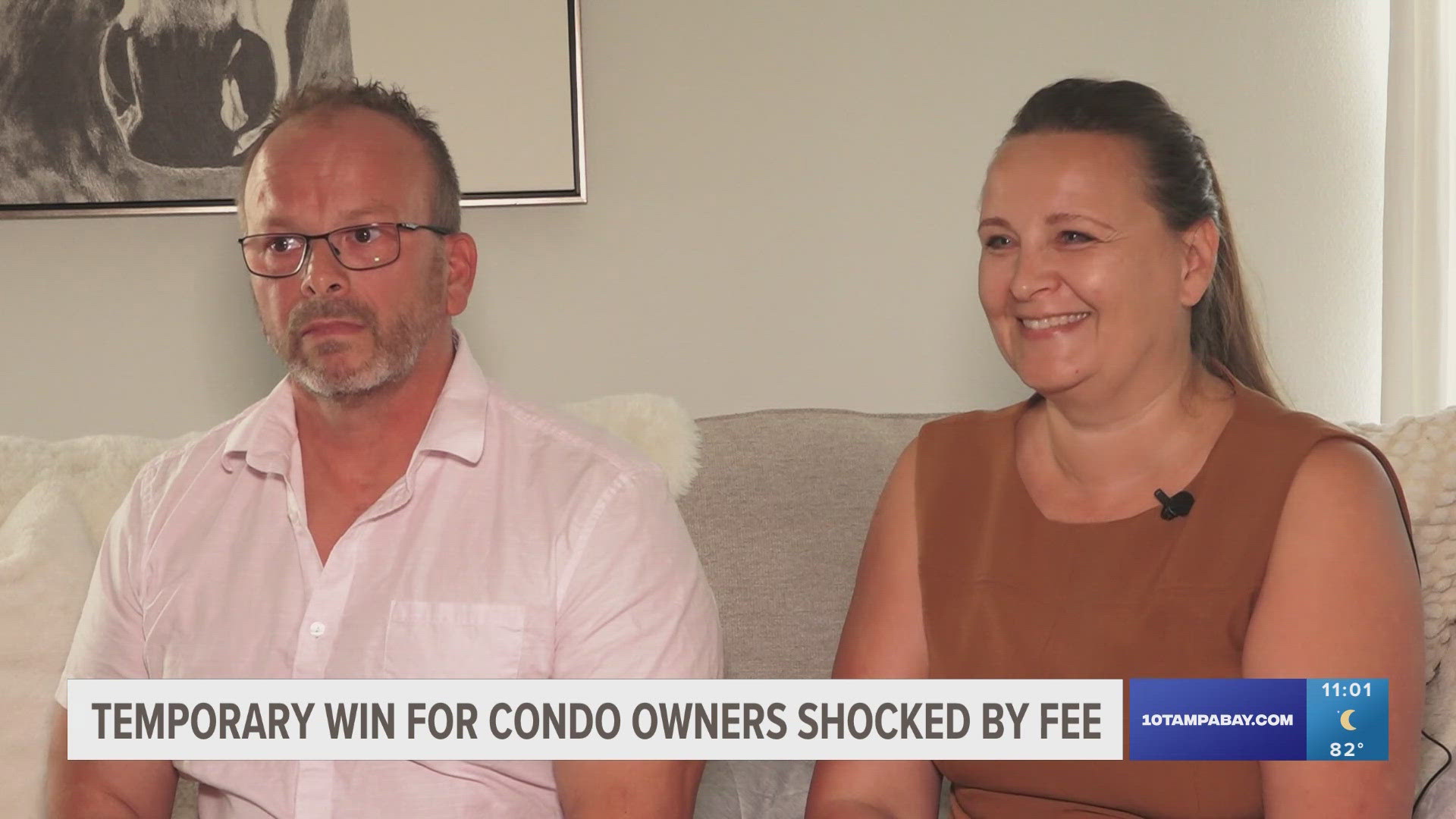FEATHER SOUND, Fla. — Update, 5:31 p.m.: 10 Tampa Bay has confirmed residents of the Villas of Carillon townhome community got an email Friday informing them the entire homeowners association board has resigned, effective immediately.
This comes after owners successfully postponed a board vote on how they would be allowed to pay a $60,000 special assessment stemming from a structural integrity reserve study.
Confusion over recent state reforms intended to prevent another tragedy like the 2021 Champlain Towers collapse in Surfside may have contributed to the management company's recommendation and the board's action to require its reserves to be "fully funded."
Those reforms require reserve and milestone studies and required yearly contributions to reserves but they only apply to units that are three stories or higher. All of the townhomes at the Villas are two stories.
The board also contended insurance companies would not insure the complex in a few years if funds weren't in reserves to pay for new roofs. However, a reserve study would have required the time equivalent cost of the project to be in a fund ahead of any renovation, if the association would want to avoid special assessments, according to Patricia Staebler, a certified reserve specialist based in Sarasota.
"There is a difference between being 100% funded and funding your reserve requirements for the upcoming fiscal year 100%," she says. "I've been doing this for 15 years. In my entire reserve specialist career, I have not seen an association which is 100% funded."
That's because reserve requirements are based on not just on cost, but time; the studies help plan for what obligations will need to be not only in the next fiscal year but in subsequent years to afford the entire cost of necessary repairs and improvements. Staebler says as long as there's a plan, boards only need to make sure the assessments for the upcoming fiscal year obligations are met as suggested in the reserve study or the reserve budget. The long-term plan must also include projected assessments with a built-in annual increase (usually 3% assessment increase) for a 30-year period. Contrary to popular belief, an association does not have to be “fully funded”, meaning they do not need the accumulative time-equivalent cost for the components reserved for; however, they shall fund their annual assessment obligations “fully”.
"Let's take an AC condenser unit, with a useful life of normally 10 years," she adds. "Let's say for easiness of mathematics, the cost is $10,000. At the end of year five, when the AC is five years old, you need to have $5,000 in the bank to be fully funded for this component. At the end of year six, you need $6,000. At the end of year seven, you need $7,000, et cetera. I call that the time equivalent value of a component. When you add this time equivalency of all components together, then you come to the total [cost of improvements.]"
But again, in this case, the Villas of Carillon has a homeowners association, which is a different chapter of Florida code, and not subject to the condo association requirements for buildings three stories and higher.
Previous story: Homeowners at the Villas Of Carillon in Feather Sound received a temporary victory just days after they were shocked by a $60,000 special assessment their HOA board wanted them to pay.
Thursday night, at a special meeting, the owners packed the room and got their wish to hold off on any decisions about the assessment for now.
“So that we're able to get additional documentation, review all the financials, see how they got to these numbers,” resident Tammy Rodeffer said.
Margaret Kras and her husband and other residents got letters saying the HOA underfunded its reserves for years, and now everyone needs to pay up to $60,000 through one of four ways:
- Pay $60,000 in four quarterly installments beginning October 1.
- Pay $60,000 in 32 quarterly installments of $1,875 over 8 years.
- Pay $11,650 in four quarterly installments, to fund immediate improvement projects
- Increase the HOA monthly dues from $575 to $1,200 for 8 years.
“Who is in a rush?” Kras said. “First of all, [we need] more research. More research and where the numbers came from.”
Then they got word that the board would vote on a payment plan at a Thursday night meeting, circulating petitions to demand the board postpone the vote.
“No one feels like they have enough information to make a good decision on our options for the assessment,” resident Nancy Radde said.
So when more than a hundred homeowners packed a Hilton ballroom and as it appeared the board wanted to vote anyway, residents went to the fine print, saying the board wasn't following Robert's Rules of Order.
In a surprise turn, the board and property management company allowed a motion to postpone going to a vote, and everyone shouted, “Aye.” Meeting adjourned.
They hope others with HOAs take note that because of recent law changes, they may get a hefty bill, too. Condo associations are grappling with rising insurance costs and the new state law requiring them to have a certain amount of reserves on hand.
HOAs, however, do not have the same requirement under state law.
"You need to get together, this problem is not going away,” Robert Regan said. “And condos, they need to have 100% reserves."
The HOA board president declined to comment after the meeting, citing counsel from their attorney.
Correction: This story has been updated to reflect the residents as townhome owners, not condominium owners.

